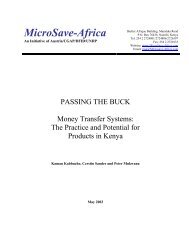Create successful ePaper yourself
Turn your PDF publications into a flip-book with our unique Google optimized e-Paper software.
tion. Calculating the growing importance <strong>of</strong> IQCs,<br />
Gilson and her team bid on and won a place on<br />
the IQC: this effort paid <strong>of</strong>f in 1996 when <strong>DAI</strong> won<br />
a task order under that contract to deliver fasttrack<br />
emergency bank lending services in Bosnia<br />
and Herzegovina. Six months after the December<br />
1995 Dayton Accords ended three <strong>years</strong> <strong>of</strong> war<br />
in this former Yugoslav republic, Gilson was on a<br />
military C-130 on her way to launch the Bosnia<br />
Reconstruction Finance Facility. This two-year<br />
contract was big in every way—<strong>DAI</strong>’s largest<br />
project up to that time in terms <strong>of</strong> revenue. In<br />
June 1996, eight bankers working for <strong>DAI</strong> arrived<br />
in Sarajevo with more than $300 million worth<br />
<strong>of</strong> credit at their disposal. Their objective was to<br />
instill a “credit culture” in a society that had no<br />
history <strong>of</strong> commercial bank lending and, above<br />
all, to create jobs and, thereby, foster stability. It<br />
was up to <strong>DAI</strong>’s bankers to decide which banks<br />
should extend how much <strong>of</strong> the money, based on<br />
the creditworthiness <strong>of</strong> the projects.<br />
As <strong>of</strong>ten happens when market forces collide<br />
with the imperatives <strong>of</strong> development and a donor<br />
agency’s agenda, this assignment was tougher<br />
than expected. The original winning <strong>DAI</strong> team<br />
was wholly composed <strong>of</strong> “pin-striped, gray-haired<br />
veteran bankers,” with a Chief <strong>of</strong> Party in that<br />
mold—just what USAID had asked for. None <strong>of</strong><br />
them had any experience working with a donor<br />
agency, however, and the Chief <strong>of</strong> Party soon lost<br />
his bearings. While Barclay was visiting Sarajevo<br />
several months into the project, the Chief <strong>of</strong> Party<br />
got up from the breakfast table one morning and<br />
announced that he was quitting immediately. <strong>DAI</strong><br />
subsequently tapped Bruce Spake—whose experience<br />
managing <strong>DAI</strong> projects in Zaire/Congo and<br />
Sri Lanka was complemented by an unflappable<br />
demeanor—to settle the team and smooth out<br />
relationships with the USAID mission and Bosnian<br />
counterparts. Above all, he had to help the bankers,<br />
unaccustomed to working in unstable environments,<br />
adjust to working in war-torn Bosnia. It<br />
was difficult, for example, to get them to understand<br />
USAID’s mandate to infuse capital; seeing<br />
instability all around, the bankers’ first response<br />
was that Bosnia’s financial institutions should<br />
curtail lending. Although he had no background<br />
in commercial banking, Spake proved adept at<br />
bridging the worlds <strong>of</strong> development and finance,<br />
and the project steadily gained traction.<br />
<strong>DAI</strong> had conducted rural<br />
finance projects, such<br />
as here in Haiti, before<br />
embarking on banking in<br />
the Eastern bloc.<br />
51



